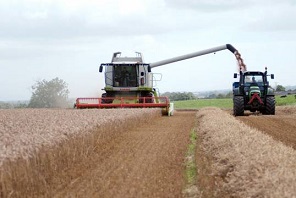Today at EFIB, some of the main European bioeconomy clusters, from France, Germany, the Netherlands and the UK joined forces as the 3BI intercluster. 3BI is a strategic European partnership that builds on the complementary strengths of four regional innovation clusters. All four clusters use biorefining to convert biological resources into materials, chemicals and fuels.

Support for European SMEs
3BI consists of the German BioEconomy Cluster that focuses on wood, BioVale from the UK that focuses on biowastes, the French IAR that focuses on the valorisation of renewable resources from agriculture, forest and algae, and the Dutch Biobased Delta that focuses on novel biological resources for its chemical industry. The clusters join forces because they feel that European SMEs need support if they are to access the important new bioeconomy markets around the world. 3BI will help European companies working in this sector to access the international partnerships and overseas markets they need. They will strengthen European collaboration and innovation to create globally competitive products and services for the bioeconomy. The ceremony for the formal signing took place today, during the coffee break on the EFIB forum in Brussels.
BioVale is a UK-based innovation cluster which aims to develop and promote innovation for the bioeconomy across Yorkshire and the Humber. This is a centre of world-class research, bio-based industry and a diverse agriculture. BioVale provides the support needed to build the region’s capability and reputation as an innovation cluster for the bioeconomy. It gives businesses access to the latest bioeconomy research and facilitates networking, dialogue and partnerships.
The region’s strengths are in valorisation of biowastes, high value chemicals from plant and microbes, lignocellulosic fuels and chemicals, and agri-tech innovation.
IAR is a world-class cluster dedicated to the bioeconomy, biobased products and biorefineries. It brings together more than 300 stakeholders from research, higher education, industry (SMEs and large companies) and agriculture, around a common goal: the optimal valorisation of renewable resources. It’s objectives are to develop, support and strengthen the French bioeconomy, boost the competitiveness of biobased industries and support job creation by leveraging innovation, training and partnership opportunities. IAR focuses particularly on integrated biorefineries, biofuels, biomaterials, biochemicals and bio-ingredients. Since 2005, IAR launched and supported 192 projects with a total R&I budget of more than € 1.4 billion.
Biobased Delta is an innovative ecosystem that builds on the strengths of the South-western region of the Netherlands. This houses agro & food companies and large chemical players, technologically advanced farmers, brand owners, a large number of innovative SMEs, renowned knowledge institutions, educational institutions, pilot and demonstration plants, and supporting governments. It’s focus is on sugar beets and other sugars as a feedstock for chemical industry, biorefinery of lignocellulosic feedstock, and valorisation of bio-based feedstock in general.
BioEconomy Cluster is located in central Germany; it is a value-added cluster that focuses on the integrated use of non-food biomass (especially beech wood and other biomass containing lignocellulose) to generate materials, chemicals, innovative products and sources of energy. Among its unique features are the cross-sector formation of value chains and the integration of an established chemical region. At the Leuna Chemical Park biorefineries have been constructed on a pilot and demonstration scale. The network of more than 100 industrial companies and research institutions is one of 15 Leading Edge Clusters of the Federal Ministry of Education and Research (BMBF).
3BI: a strategic European partnership
The four clusters look upon 3BI as a strategic European partnership that builds on their complementary strengths. All four clusters use biorefining to convert biological resources into food, feed, materials, chemicals and fuels. They intend to work together in the research, development and deployment of novel high-tech approaches to the conversion of biomass, renewable raw materials and waste streams into value-added products and applications. They will focus on growth, innovation and smart specialisation of their regions to promote sustainable solutions for a lower carbon footprint.
